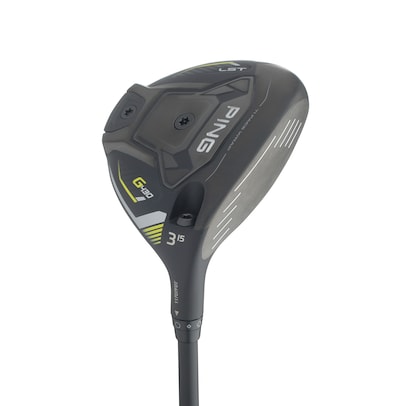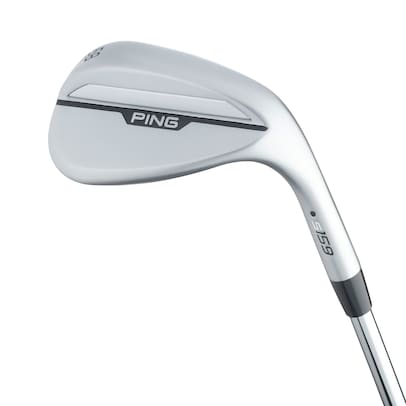What's in My Bag: Harris English
I’m a “Jeopardy!” fanatic, although I don’t watch it as much now that we have a 1-year-old. I just like trivia. I don’t know all the answers, but it’s fun to blurt out random stuff and sometimes be right. I like science, math or U.S. geography questions. But, man, when they go to the Opera or Shakespeare plays, I know I’m done. —With E. Michael Johnson
DRIVER
SPECS: Ping G430 LST, 10.5°, Fujikura Ventus TR Blue 6-X shaft, 45 inches.
I don’t spin my driver that much, so I have to play a little higher loft since this is a lower-spinning head. It’s been an evolution over time. In college, I played 9 degrees, but as the ball spun less over time, I had to reevaluate and go up in loft. I also love the acoustics of this driver. The powerful sound fits what I like to hear.

This muscular but compact 3-wood gets its energy from a multimaterial construction that mixes perfectly, fitting pieces like an NBA general manager filling out the ideal starting five. First, the titanium body saves weight while making room for a special high-strength alloy in the face for better ball speed and distance. That face wraps around the toe region to create a larger area for faster ball speeds. Then, a carbon-composite section wraps around the back half of the crown and into the heel and toe to save more weight. A hefty tungsten soleplate lowers the center of gravity for reduced spin and optimal launch.
FAIRWAY WOOD
SPECS: Ping G400, 14.5°, Fujikura Atmos Blue 7-X shaft, 42.75 inches.
This is an older model. I tend not to change clubs a lot. The 3-wood is one of the hardest clubs to change because we’re hitting it off the ground and hitting it off the tee. I also want enough spin where it stays in the fairway as well as the ability to work it on a dogleg. This club checks all those boxes, so why change?
IRONS
SPECS: (3-iron): Ping G410 Crossover, Fujikura Atmos Black hybrid 9-X shaft; (4-9): Ping Blueprint T, True Temper Dynamic Gold Tour Issue X100 shafts; Golf Pride Tour Velvet Align grips.
I enjoy the workability of these irons with the tight pins we typically face on tour. I don’t need a big cavity-back to help me get the ball up in the air. The feel is superb, too.
WEDGES

With 25 stock options and six sole grinds, Ping wants to help as many kinds of swings as possible deliver the club efficiently through the turf. Spin is another important area of emphasis. The design of the grooves changes depending on the loft. Lower lofts feature volume to channel maximum debris on full shots. Grooves on the lower lofts (54 to 62 degrees) are tightly spaced so that the edges contact the ball cleanly. Throw in a friction-adding face blast, and you get more bite than an angry Rottweiler.
SPECS: Ping s159 (46°), True Temper Dynamic Gold Tour Issue X100 shaft; 52°, 56°, 60°, True Temper Dynamic Gold Tour Issue S400 shafts.
The pitching wedge matches the rest of my wedges. I do that because I use it around the green more than most. I like to play bump-and-run a lot. It has a little better feel as well. I’ll go back and forth on the bounce with the 60-degree wedge, depending on course conditions. If the turf is firm, I prefer less bounce.
PUTTER
SPECS: Ping Scottsdale Hohum, 36.25 inches, 3° loft, Ping Winn AVS Palm-lock grip.
I started using this putter my senior year of college in 2011. It was sent to my teammate Keith Mitchell. I always played Ping since I was probably 12 years old. I started putting with it and kind of got on a heater my senior year, and it’s been in the bag since. I like my putter grip to be worn. I’ll have the Ping guys sand down a new grip to make it feel a little tacky.
DUAL ALIGNMENT
The red line on the ball helps, but I mostly use the Titleist name on my Pro V1, lining it perpendicular to the putterface for aiming.
SCHOOL PRIDE
I got this yardage book at the 2019 Greenbrier event. I’d never used a yardage book before because I tend to lose things. Go, Dawgs!
MONEY MARK
I used to use only a 1989 quarter to mark my ball. It represented the year I was born, but now any old quarter will do.
The Hit List
The best of Golf Digest delivered daily
Sign UpWill be used in accordance with our PRIVACY POLICY